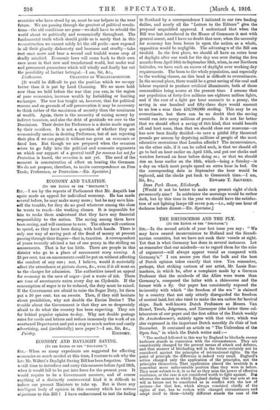ECONOMY AND DAYLIGHT SAVING.
[To TEE EDITOR OP THE " SPECTATOR."]
SIR,—When so many expedients are suggested for effecting economies so much needed at this time, I venture to ask why the lato Mr. Willett's Daylight Saving Bill has been forgotten. There is still time to introduce and carry this measure before April 16th, when it would fall to be put into force for the present year. It would require to be a Government measure, and of course anything of a distinctly controversial kind it is difficult to induce our present Ministers to take up. But is there any intelligent body of opinion in this country which has serious objections to this Bill ? I have endeavoured to test the feeling in Scotland by a correspondence I initiated in our two leading dailies, and nearly all the "Letters to the Editors" give the proposal unqualified approval. I understand that when the Bill was last introduced in the House of Commons it met with general assent, and I have no doubt that now, when the necessity for economy has been borne in upon the nation as a whole, opposition would bo negligible. The a,dvantagn of the Bill are twofold. In the first place, we should all have an extra hour of daylight after our work for the day was over during the five months from April 16th to September 16th, when, in our Northern latitudes, we have such an excess of daylight over working-day requirements. The boon to the whole population, and especially to the working classes, on this head is difficult to overestimate. In the second place, there would be a great saving of the coal and labour required to produce artificial illuminants, both of these commodities being scarce at the present time. I assume that our population of forty-five millions use eighteen million lights, and if the cost of a light per hour amounts to a penny, the saving in one hundred and fifty-three days would amount to no less a sum than £10,700,000 sterling. This may be an overestimate, but there can be no doubt that tho saving would run into many millions of pounds. Is it not far better that we should effect a saving of this kind, that would benefit all and hurt none, than that we should close our museums—as has now been finally decided—to save a pitiful fifty thousand pounds per annum by depriving millions of people of the most educative recreations that London affords ? The inconvenience, on the other side, if it can bo called such, is that we should all go to bed an hour earlier on April 15th, and put our clocks and watches forward an hour before doing so ; or that we should rise an hour earlier on the 16th, which—being a Sunday—is a day on which most people spend an extra hour in bed. On the corresponding date in September the hour would be replaced, and the clocks put back to Greenwich time.—I am, Sir, &c., EDWARD T. SeLvzszzr. Dean Park House, Edinburgh.
[Would it not be better to make our present eight o'clock permanently nine? In midwinter the mornings would be rather dark, but by this time in the year we should have the satisfac- tion of not lighting lamps till seven p.m.—i.e., only one hour of darkness before dinner.—En. Spectator.]


































 Previous page
Previous page